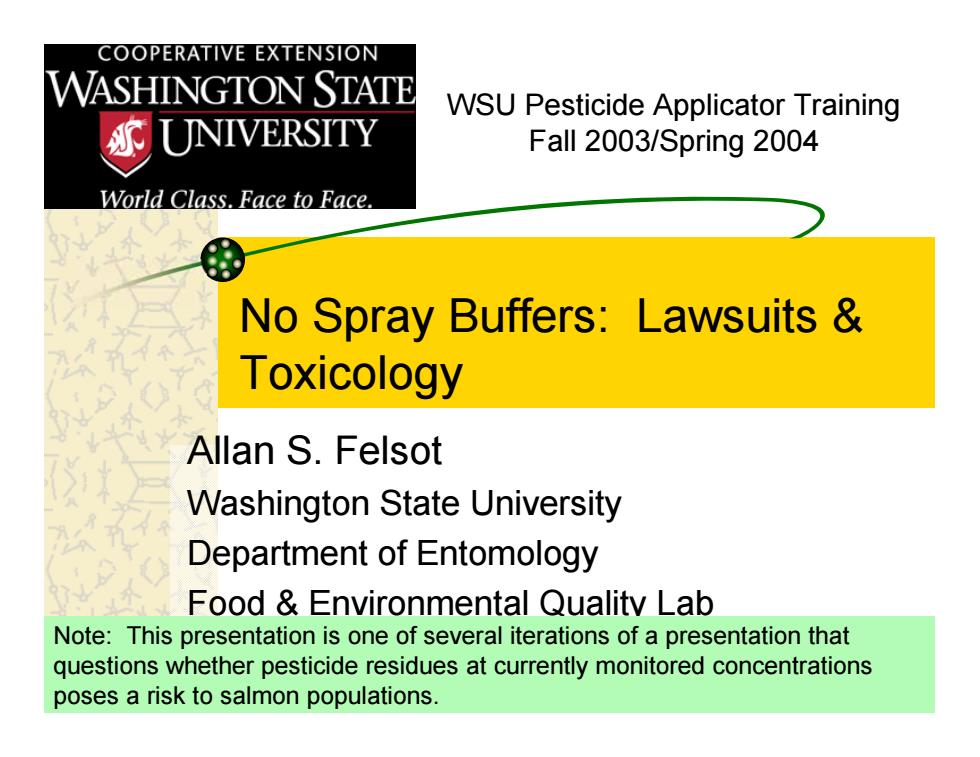
COOPERATIVE EXTENSION WASHINGTON STATE 水UNIVERSIT亚 WSU Pesticide Applicator Training Fall 2003/Spring 2004 World Class.Face to Face. No Spray Buffers:Lawsuits Toxicology Allan S.Felsot Washington State University Department of Entomology Food Environmental Quality Lab Note:This presentation is one of several iterations of a presentation that questions whether pesticide residues at currently monitored concentrations poses a risk to salmon populations
No Spray Buffers: Lawsuits & Toxicology Allan S. Felsot Washington State University Department of Entomology Food & Environmental Quality Lab WSU Pesticide Applicator Training Fall 2003/Spring 2004 Note: This presentation is one of several iterations of a presentation that questions whether pesticide residues at currently monitored concentrations poses a risk to salmon populations
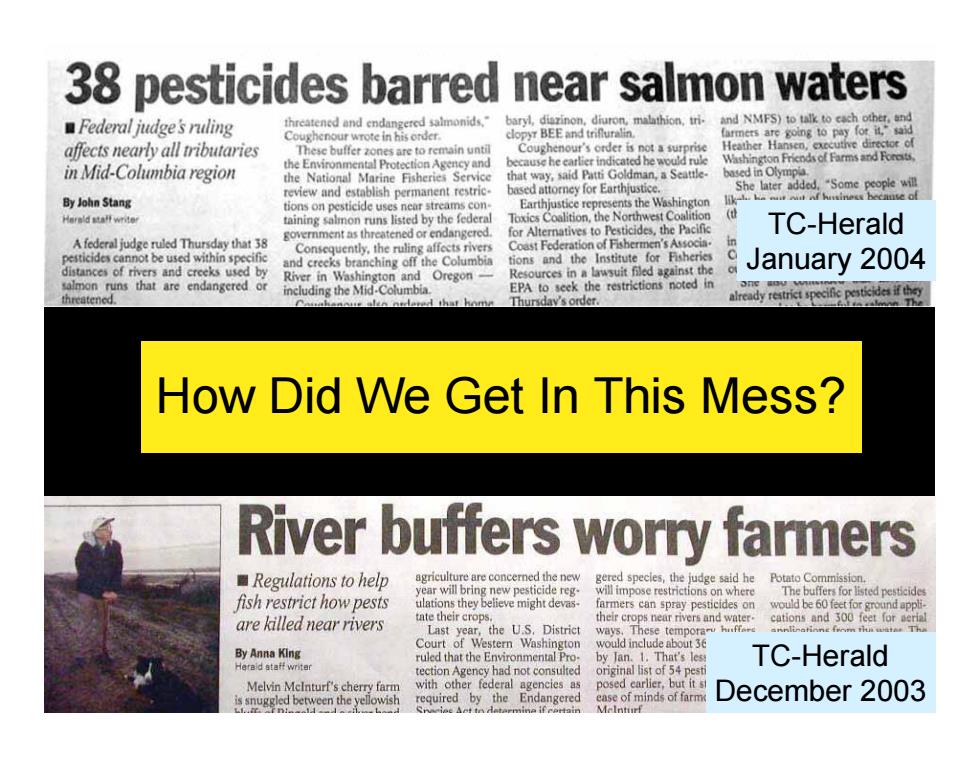
38 pesticides barred near salmon waters Federal judge's ruling baryl,diazinon.diuron.malathion.tri. clopyr BEE and trifluralin. affects nearly all tributaries These buffer aones are to remain until Heather Hansen.cccuthe in Mid-Columbia region the Environmental Protection Agency and ause he catlict indicated he the National Marine Fisheries Service way,said Patti Goldman.a. based in Olympla. review and establish permanent restric. By John Stang tions on pesticide uses near streams con. Earthjustice repthe Wshington Harald atalf writer Toics Coalition.the Northwest Coalit (d for Alternatives to Pesticides,the Pacific TC-Herald A federal judge ruled Thursday that 38 Coast Federation of Fishermen's Associa. pesticides cannot be used within specific Consequently,the ruling affects rivers and crecks branching off the Columbia ions and the Institute for Fsheries uit fled against the January 2004 River in Washington and Oregon- including the Mid-Columbia. EPA to seek the rest etions noted in tea蓝y Thursdav's order. How Did We Get In This Mess? River buffers worry farmers Regulations to help agriculture are concerned the new gered specles,the judge said he ar will brin fish restrict how pests ulations they believe might devas e their crop p yould be 60 feet for are killed near rivers the U.S.District By Anna King Herald staf writer econ Agency had not consuled TC-Herald 54 pest Melvin Melnturf's cherry farm with other federal agencies as December 2003
How Did We Get In This Mess? TC-Herald January 2004 TC-Herald December 2003
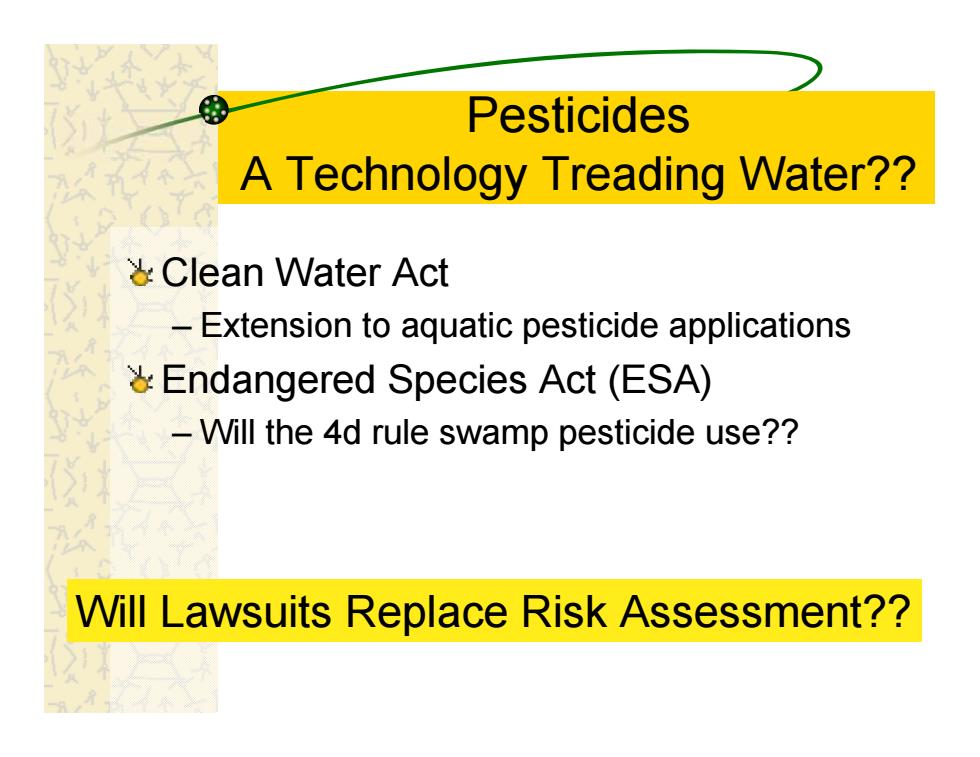
Pesticides A Technology Treading Water?? Clean Water Act -Extension to aquatic pesticide applications Endangered Species Act (ESA) -Will the 4d rule swamp pesticide use?? Will Lawsuits Replace Risk Assessment??
Pesticides A Technology Treading Water?? Clean Water Act – Extension to aquatic pesticide applications Endangered Species Act (ESA) – Will the 4d rule swamp pesticide use?? Will Lawsuits Replace Risk Assessment??

Imigation district to pay for fish kill MEDFORD-The Talent Irrigation District has agreed to pay $200,000 to settle a lawsuit over a 1996 herbicide spill that killed 92,000 young salmon and steelhead in a nearby creek. Tri-City Herald NoV.9,2001
Tri-City Herald Nov. 9, 2001

Talent Irrigation District Case Earth Justice/NCAP sued under the pretense of a violation of the Clean Water Act -Premise:NPDES (National Pollution Discharge Elimination System)Permit needed for aquatic pesticide applications Judge agreed with EJL/NCAP Despite the conflict with FIFRA All aquatic applications need an NPDES permit
Talent Irrigation District Case Earth Justice/NCAP sued under the pretense of a violation of the Clean Water Act – Premise: NPDES (National Pollution Discharge Elimination System) Permit needed for aquatic pesticide applications Judge agreed with EJL/NCAP – Despite the conflict with FIFRA All aquatic applications need an NPDES permit
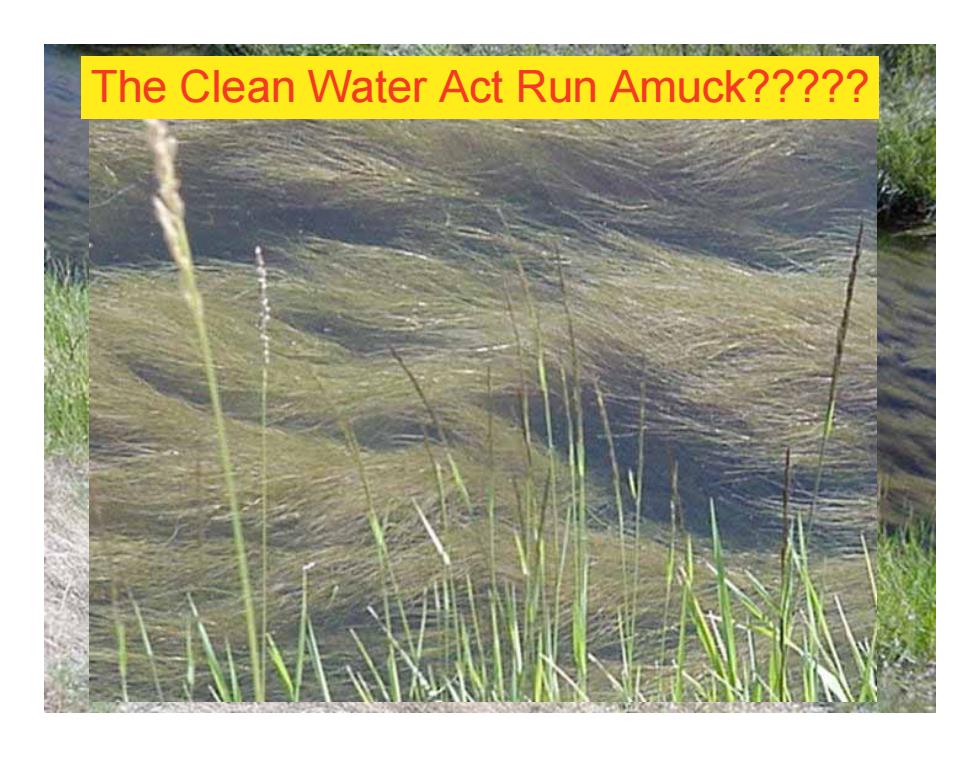
The Clean Water Act Run Amuck?????
The Clean Water Act Run Amuck?????
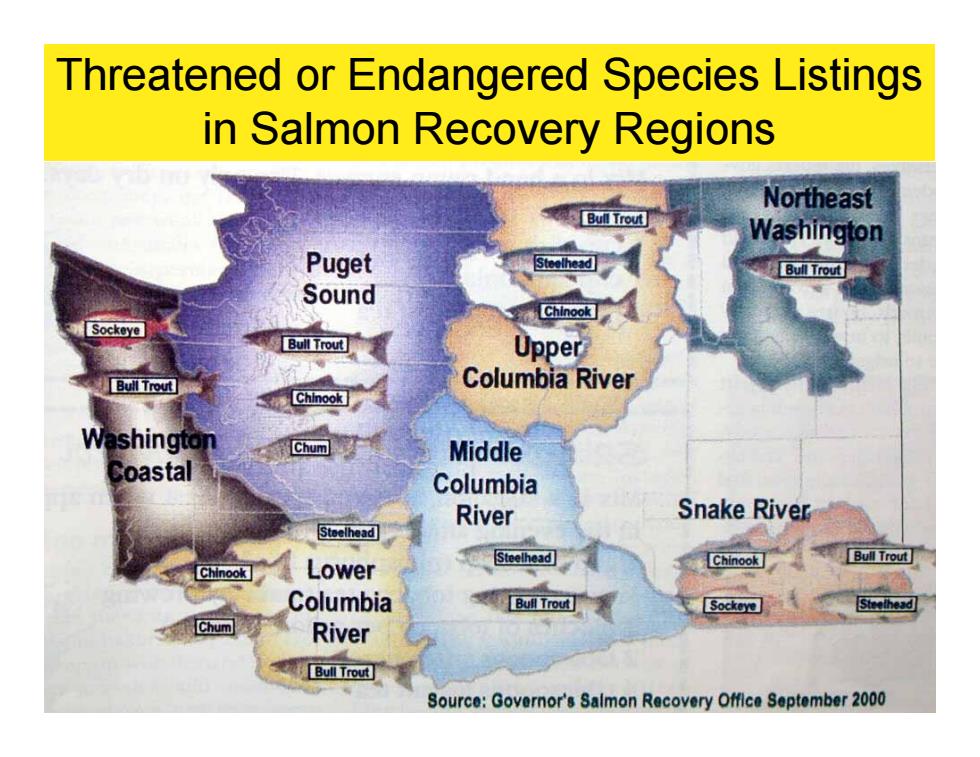
Threatened or Endangered Species Listings in Salmon Recovery Regions Northeast Bull Trout Washington Puget Bull Trout Sound Chinook Sockeye Bull Trout Upper Bull Trout Columbia River Chinook Washington Chum Middle Coastal Columbia River Snake River Steelhead chinook Lower 5eha回 Bull Trout Columbia Bull Trout Sockey间 Chum River Bull Trout Source:Governor's Salmon Recovery Office September 2000
Threatened or Endangered Species Listings in Salmon Recovery Regions

Federal ESA Section 4(Factors for Listing Determination) -Present or threatened destruction,modification, or curtailment of its habitat or range; -Over-utilization for commercial,recreational, scientific,or educational purposes; Disease or predation; Inadequacy of existing regulatory mechanisms; - Other natural or manmade factors affecting its continued existence
Federal ESA Section 4 (Factors for Listing Determination) – Present or threatened destruction, modification, or curtailment of its habitat or range; – Over-utilization for commercial, recreational, scientific, or educational purposes; – Disease or predation; – Inadequacy of existing regulatory mechanisms; –Other natural or manmade factors affecting its continued existence
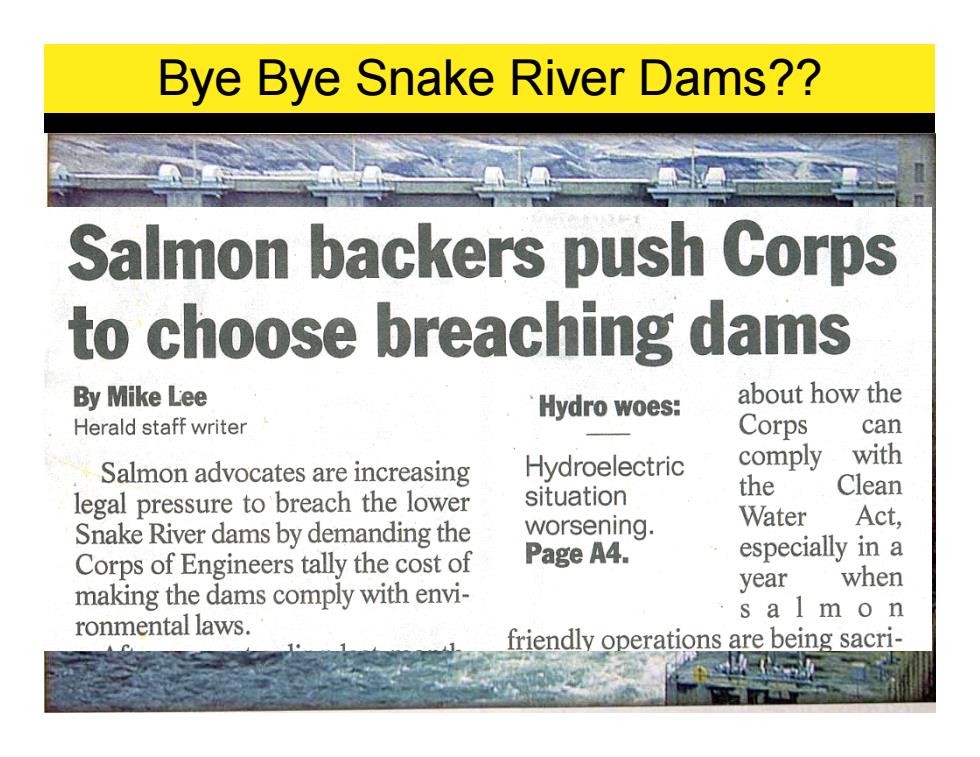
Bye Bye Snake River Dams?? Salmon backers push Corps to choose breaching dams By Mike Lee Hydro woes: about how the Herald staff writer Corps can with Salmon advocates are increasing Hydroelectric comply situation the Clean legal pressure to breach the lower worsening. Water Act, Snake River dams by demanding the Corps of Engineers tally the cost of Page A4. especially in a when making the dams comply with envi- year s a l m o n ronmental laws friendly operations are being sacri-
Bye Bye Snake River Dams??

Historical Perspective??? "Salmon and steelhead fishing was once a very valuable industry to the west coast economy.As recently as 1988.salmon and steelhead fishing.brought in $1.25 billion to the regional economy and supported an estimated 62,750 family wage jobs.Since then,many salmon runs have declined because of a combination of many factors including too many dams and widespread habitat loss. "One likely fact that has received little scrutiny, however,is the long-term impact of increasing uses of agricultural chemicals and pesticides in many Northwest river systems." Pacific Rivers Council Research Report(1992)
Historical Perspective??? “Salmon and steelhead fishing was once a very valuable industry to the west coast economy. As recently as 1988.salmon and steelhead fishing.brought in $1.25 billion to the regional economy and supported an estimated 62,750 family wage jobs. Since then, many salmon runs have declined because of a combination of many factors including too many dams and widespread habitat loss. “One likely fact that has received little scrutiny, however, is the long-term impact of increasing uses of agricultural chemicals and pesticides in many Northwest river systems.” Pacific Rivers Council Research Report (1992)